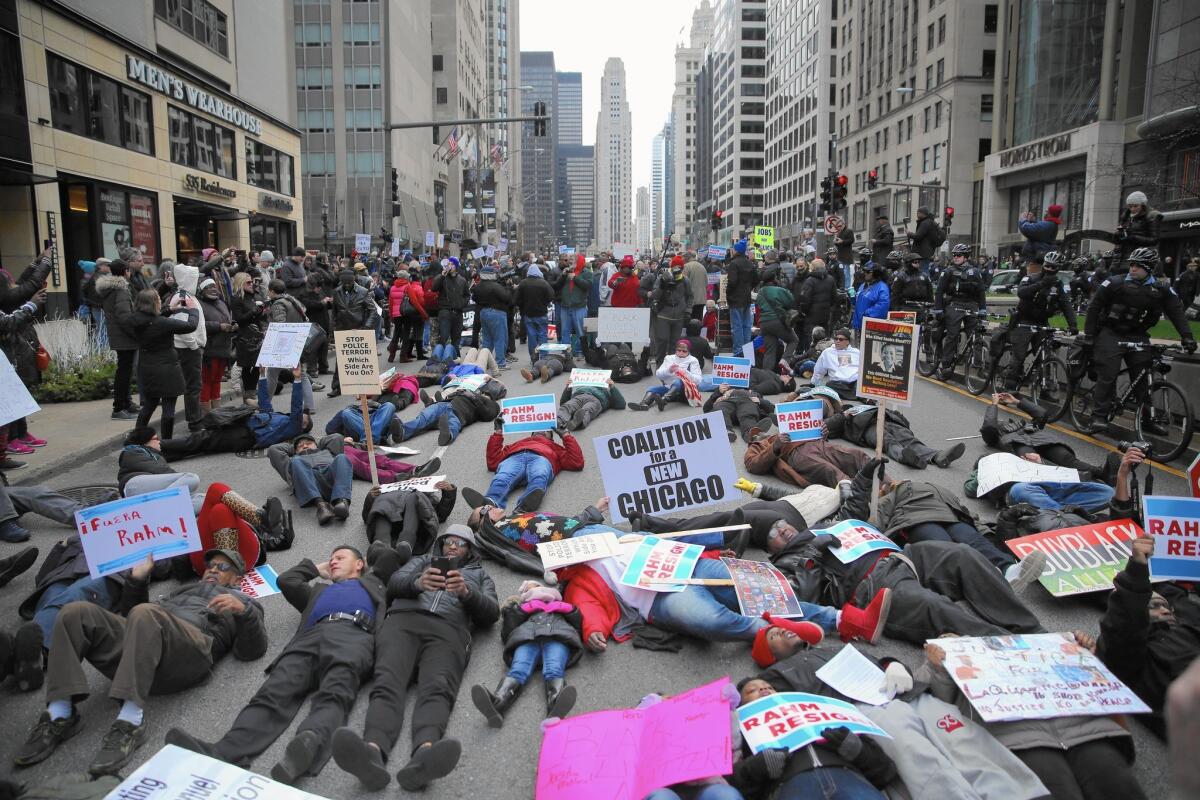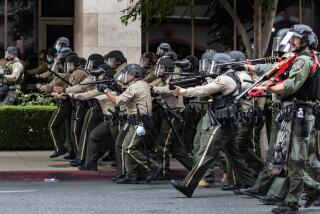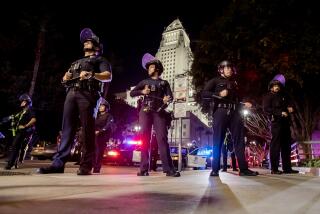Just before Christmas, Black Lives Matter protests roil cities across the U.S.

Demonstrators hold a “die-in” on North Michigan Avenue in Chicago. The “Black Christmas” demonstration on Thursday, organizers said, was held to protest the killing of Laquan McDonald, a black teen shot 16 times by Chicago police last year.
- Share via
It’s the most wonderful time of the year and a winter of discontent, a season of police bullhorns and Christmas lights.
Demonstrators protesting police shootings of black men confronted last-minute holiday shoppers and travelers in California and the Midwest this week, seeing the crowds as an opportunity to draw attention to their cause.
In Chicago on Thursday, more than 100 demonstrators marched down North Michigan Avenue, the city’s premier shopping corridor, and laid down on the street for a “die-in.” They also blocked access to some stores where Christmas Eve shoppers were hoping to wrap up their tardy gift-buying.
The demonstrators were again protesting the October 2014 police shooting of Laquan McDonald, a black 17-year-old carrying a knife who was killed when a Chicago police officer shot him 16 times.
The officer, Jason Van Dyke, has been charged with first-degree murder. Footage released last month appeared to show McDonald walking away from Van Dyke, sparking protests that have yet to fully die down, much as the Black Lives Matter movement has remained in national headlines since last year’s protests in Ferguson, Mo.
“When one part of Chicago is affected, all of Chicago is affected,” one of the demonstrators, Alex Thiedmann, said of the “Black Christmas” demonstration on North Michigan Avenue. “If I remain silent, I become an oppressor.”
Onlookers affected by the protest had a mixed response. Emily Grossman, 36, was kept from getting an iPhone at the Apple Store. “I hate to put myself first, but this is BS,” she said.
Rabiah Muhammad came downtown for a doctor’s appointment but stopped to watch the protests.
“I was walking down the street and I saw all these beautiful people of all ages and colors,” she said. “I think it’s a bigger problem than the city of Chicago. It’s an American problem. This kind of brutality? That’s not what our country is supposed to be.”
A day earlier, shoppers and travelers also encountered demonstrators in Los Angeles, San Francisco and Minneapolis.
On Wednesday afternoon, activists affiliated with the Black Lives Matter movement shut down the southbound lanes of the 405 Freeway in Westchester for about 10 to 15 minutes, writing chalk messages on the pavement. Up to nine demonstrators were arrested.
“On one of the busiest travel days of the year, Black Lives Matter is calling for a halt on Christmas as usual in memorial of all of the loved ones we have lost and continue to lose this year to law enforcement violence without justice or recourse,” a statement from Black Lives Matter organizers said.
One activist, Pete White, said the demonstration was motivated in part by the Los Angeles County district attorney’s recent decision not to charge a California Highway Patrol officer who repeatedly punched a woman, Marlene Pinnock, along the Harbor Freeway.
The same afternoon, eight protesters were arrested while blocking the San Francisco International Airport off-ramp for about half an hour, the San Francisco Chronicle reported.
They were protesting the death of Mario Woods, who was holding a knife when he was shot by several police officers on Dec. 2. Demonstrators called the shooting a grave overreaction.
“The concept behind the whole protest is that we’re stopping business as usual,” Ronnishia Johnson, a Black Lives Matter activist, told the Chronicle.
Wednesday’s most dramatic protest was in Minneapolis, which has been roiled by unrest since the Nov. 16 death of Jamar Clark, who was shot once in the head by a police officer. Protesters say Clark, who was unarmed, was wearing handcuffs when he was shot; the Police Department denies the allegation.
Hundreds of demonstrators swarmed the Mall of America, the local light rail system and even Minneapolis-St. Paul International Airport — resulting in closed stores, delayed flights and surreal images of riot police clogging escalators and entrances that said, “Welcome to Mall of America.”
“You have to go after economics — they’re more focused on profits rather than helping us obtain justice for Jamar,” Jason Sole, the criminal justice reform chair of the Minneapolis NAACP and a dedicated protester, told the Los Angeles Times.
Protesters wanted the huge “platform” offered by the enormous Mall of America, and “as a result we were able to impact them where it hurts, which is through their dollars,” Sole said.
At the Minneapolis airport, officials shut down two security checkpoints to fliers for 45 minutes after protesters came inside one terminal, resulting in a few delayed flights, airport spokesman Patrick Hogan said. The clogging of another terminal’s roadway also probably led to some missed flights for passengers who couldn’t get dropped off, he said.
Sole said one of the reasons for the airport demonstration was “to highlight that many of our Muslim brothers and sisters” don’t get the same treatment as other travelers.
He wasn’t sorry about the disruption the protests caused.
“Many reporters and different media folks just say, ‘Man, you guys are causing a major disruption,’” Sole said. “We’re not anti-Christmas, we’re not anti-police, we’re anti-police brutality.... Jamar, he won’t be around a Christmas tree this year.”
Twitter: @MattDPearce
Times staff writer Kate Mather and the Chicago Tribune contributed to this report.
More to Read
Sign up for Essential California
The most important California stories and recommendations in your inbox every morning.
You may occasionally receive promotional content from the Los Angeles Times.











